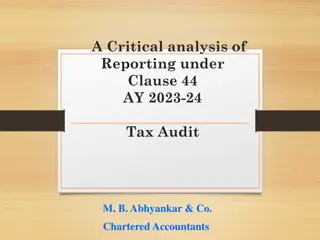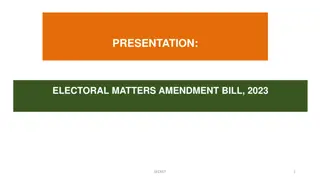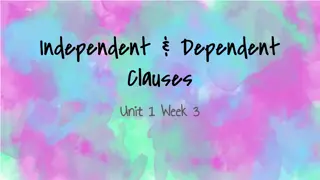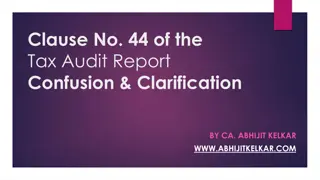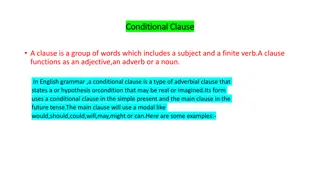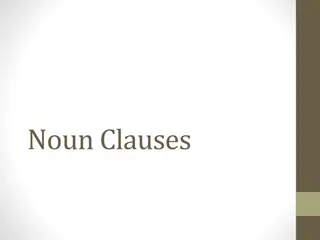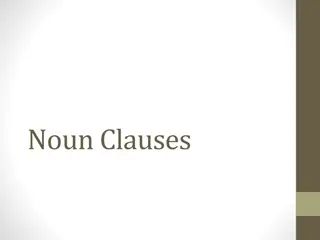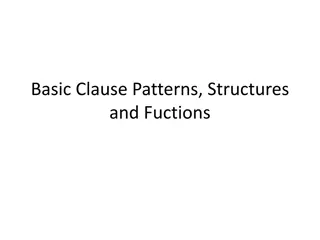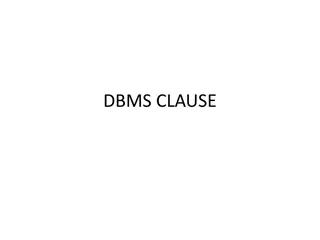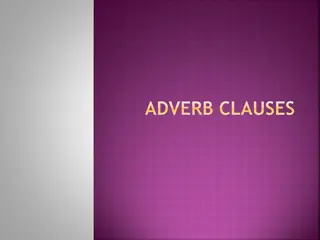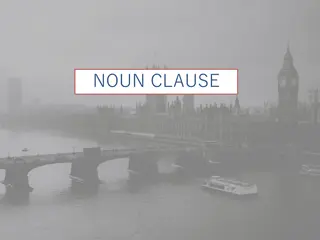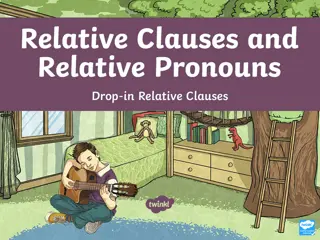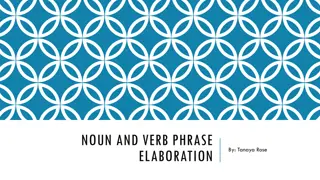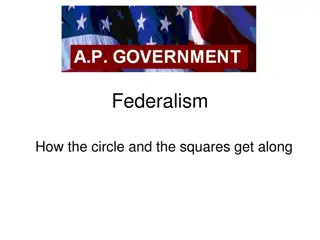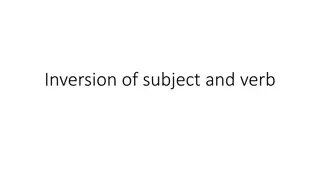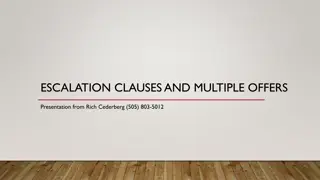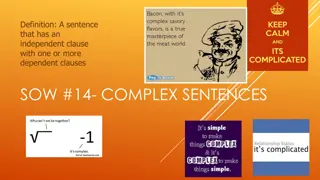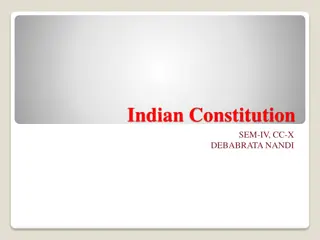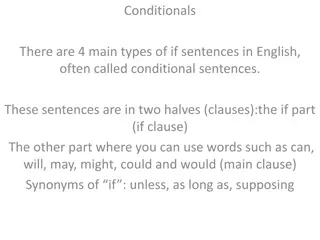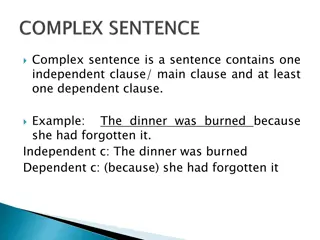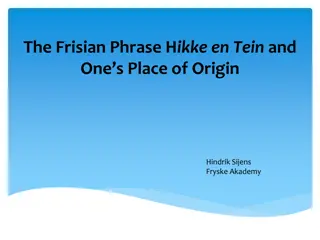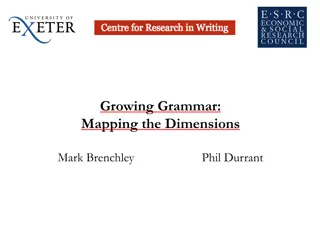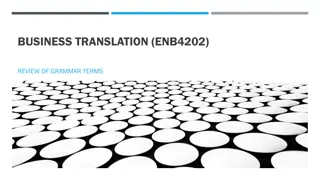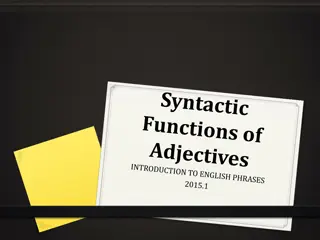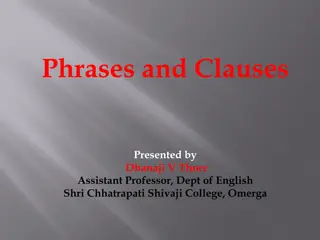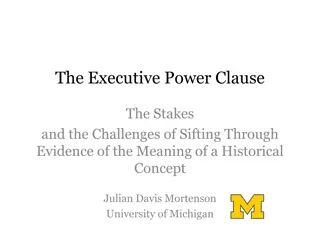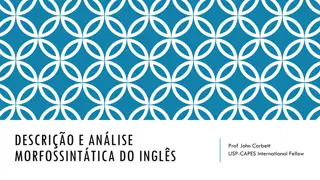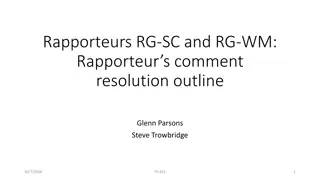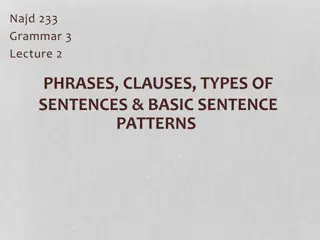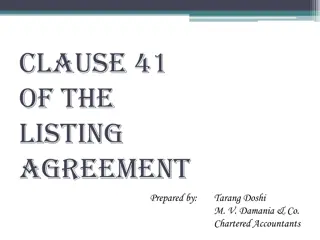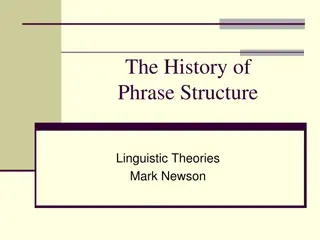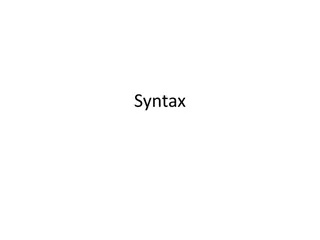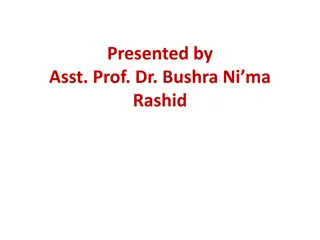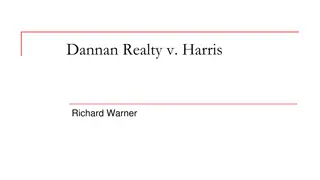Understanding the Need for Reporting Under Clause 44 in Tax Audit
Analysis of Clause 44 under Tax Audit, discussing modifications in Form 3CD, the optional reconciliation of expenses, challenges in database reconciliation, implications for assessees, and the importance of providing accurate information to align with GST regulations.
0 views • 10 slides
Progress Update on Electoral Matters Amendment Bill 2023
This presentation outlines the purpose, clause-by-clause analysis, constitutional court judgments, and recommendations concerning the Electoral Matters Amendment Bill 2023. It aims to inform the Joint Sitting of the Portfolio Committee on Home Affairs and the Select Committee on Justice about the de
0 views • 21 slides
Understanding Independent and Dependent Clauses
An independent clause contains a subject and a verb, forming a complete sentence on its own, while a dependent clause also has a subject and a verb but cannot stand alone. Dependent clauses rely on independent clauses to form complete sentences and are introduced by subordinating conjunctions. When
0 views • 4 slides
Understanding Clause 44 of Tax Audit Report with CA Abhijit Kelkar
In the Tax Audit Report under the Income Tax Act, Clause 44 has become mandatory from April 2022 onwards. This clause requires detailed reporting of various expenditure and payment details related to GST-registered entities. The provision was kept on hold till March 2022 due to the pandemic, but now
0 views • 25 slides
Understanding Conditional Clauses in English Grammar
A conditional clause is a type of adverbial clause in English grammar that states a hypothesis or condition using a conditional clause in the simple present and the main clause in the future tense. This type of clause uses modal verbs like would, should, could, will, may, might, or can. Conditional
2 views • 6 slides
Understanding Noun Clauses: Examples and Usage
A clause is a group of words with a subject and a verb, while a phrase lacks a subject and verb. Noun clauses, which function as nouns, can be subjects, objects of verbs or prepositions, and complements. They often begin with question words like what, when, or why. Examples illustrate their usage in
2 views • 49 slides
Understanding Noun Clauses in English Grammar
A clause is a group of words with a subject and a verb, while a phrase lacks one. Independent clauses can stand alone, while dependent clauses cannot. Noun clauses function as nouns in a sentence, serving different roles like subjects, objects, prepositional objects, and complements. They can start
1 views • 49 slides
Understanding Basic Clause Patterns and Structures
Explore the core concepts of clause patterns, structures, and functions, including independent and dependent clauses, sentence types, compound sentences, and conjunction usage. Learn about the components of a clause, how to identify independent clauses, and how they can be linked to form compound se
2 views • 38 slides
Understanding WHERE Clause in DBMS
The WHERE clause in a database management system (DBMS) is used to fetch filtered data based on specific criteria or patterns. Operators such as >, >=, <, <=, =, <>, BETWEEN, LIKE, and IN can be used with the WHERE clause to define filtering conditions. This article explains the usage of WHERE claus
1 views • 24 slides
Understanding Noun Clauses in English Grammar
A clause is a group of words with a subject and verb, while a phrase lacks one. Noun clauses, functioning as nouns, serve various roles in sentences. They can be subjects, objects of verbs/prepositions, or complements. Starting with question words like what, when, or why, these clauses mirror statem
0 views • 49 slides
Understanding Adverb Clauses: Usage and Examples
Adverb clauses help to establish relationships between ideas by indicating time, cause and effect, contrast, and condition. They are dependent clauses that must be connected to a main clause. Punctuation plays a key role in distinguishing between adverb clauses that precede or follow a main clause.
0 views • 43 slides
Understanding Noun Clauses and Their Functions
A clause is a group of words containing a subject and predicate forming part of a sentence. Noun clauses act as nouns in a sentence and can function in various ways, such as being the subject or object of a verb, participle, or preposition. They are identified by asking "who" or "what" questions and
0 views • 23 slides
Understanding Relative Clauses and Pronouns
Utilize relative clauses to provide additional information to a noun, using relative pronouns such as who, which, where, when, and whose. Learn how to construct complex sentences with at least two clauses, ensuring the subordinate clause complements the main clause. Explore examples and practical st
2 views • 14 slides
Understanding Grammatical Development in Speech-Language Pathology
Explore a broader perspective of grammatical development in speech-language pathology focusing on noun and verb phrase elaboration. Learn about identifying and elaborating noun phrases, substitution tests, and the elements of an elaborated noun phrase. Gain insights into clinical approaches and lang
0 views • 28 slides
Understanding Federalism in the United States
Federalism in the United States involves the relationship between the federal government and state governments, with terms such as delegated powers, reserved powers, concurrent powers, and the Elastic Clause playing key roles. The aftermath of events like Hurricane Katrina and policies such as No Ch
0 views • 30 slides
Analysis of Confrontation Clause in Recent Legal Cases
The analysis delves into the interpretation of the Confrontation Clause in legal cases such as State v. Mitchell and recent developments like the Bullcoming v. New Mexico case. The discussion revolves around testimonial statements, expert witness testimony reliability, and the requirement of actual
0 views • 29 slides
Understanding Inversion in English Grammar
Inversion in English grammar refers to the reversal of the usual word order of a subject and a verb in a sentence. This reversal often occurs when starting a sentence with an adverb or adverbial phrase of place, creating a more dramatic effect. Inversion is also seen in direct speech, where the subj
0 views • 11 slides
Understanding Grammar: Clauses in Sentences
A clause is a fundamental part of a sentence that comprises a subject and a verb. A clause can either stand alone as a sentence or be dependent on a main clause. Independent clauses can function independently, while dependent clauses rely on main clauses for context. Examples and explanations help c
0 views • 28 slides
Understanding Escalation Clauses in Real Estate
An escalation clause, also known as an escalator, allows a home buyer to increase their offer if a competing offer is higher. This presentation explains the components of an escalation clause, how it works in multiple offer situations, and provides sample language for incorporating it into a real es
0 views • 8 slides
Understanding Complex Sentences in English Grammar
Complex sentences consist of an independent clause along with one or more dependent clauses. The independent clause can stand alone, while the dependent clauses rely on the independent clause for meaning. Differentiating between independent and dependent clauses is essential in understanding how com
0 views • 15 slides
Exploring NLP and Machine Translation Through Examples
In the content provided, we delve into the concepts of Natural Language Processing (NLP), Machine Translation, and Phrase Alignment through various examples. The visuals illustrate phrase-based translations, alignment comparisons between Spanish and English sentences, and the integration of environm
1 views • 20 slides
Evolution of the Indian Constitution: A Historic Journey
With 395 articles and 12 schedules, the Indian Constitution, effective since January 1950, is one of the world's longest. Framed over three years from December 1946 to December 1949, the Constituent Assembly painstakingly discussed and refined drafts clause by clause. The history of the Constitution
0 views • 16 slides
Understanding the 4 Main Types of Conditional Sentences in English
Conditional sentences in English consist of two parts: the "if" clause and the main clause. There are four main types of conditional sentences - Zero Conditional, First Conditional, Second Conditional, and Third Conditional. Each type is used to express different conditions and outcomes based on cer
1 views • 16 slides
Understanding Sentence Structure: Simple, Compound, and Complex Sentences
Explore the basics of sentence structure through simple sentences with one independent clause, compound sentences containing multiple independent clauses, sentence fragments, and complex sentences combining an independent clause with a dependent clause. Examples and guided practice included.
0 views • 22 slides
Understanding Complex Sentences and Clauses
Complex sentences consist of an independent clause and at least one dependent clause, such as adjective, adverb, or noun clauses. They are connected using subordinate conjunctions, relative pronouns, and relative adverbs. Each has a specific role in modifying nouns, pronouns, verbs, adverbs, or conn
0 views • 14 slides
Unraveling the Frisian Phrase "Hikke en Tein" and Its Origins
Explore the intriguing Frisian phrase "Hikke en Tein" and its rich cultural significance. Delve into its origins in Tytsjerksteradiel and the interpretations related to birthing, procreation, and movement. Uncover the various dimensions of this phrase through historical references and linguistic ana
0 views • 8 slides
Exploring Grammar Dimensions and Writing Development Insights
Delve into the intricate world of grammar dimensions, writing development, and systematic literature reviews. Discover how grammar is utilized in writing pieces and explore findings related to phrase and clause levels. Uncover insights on discourse flow and subject structures.
0 views • 25 slides
Understanding Grammar Terms in Business Translation (ENB4202)
Explore key grammar terms such as action verb, adjective, adverb, article, clause, coordinating conjunction, dependent clause, gerund, linking verb, noun, noun phrase, object, phrase, preposition, pronoun, and subject in the context of business translation. Learn their definitions, functions, and ex
0 views • 14 slides
Understanding Adjective Phrases in English Grammar
Learn about different types of adjective phrases in English grammar, including attributive, predicative, post-modifier, head of a noun phrase, verbless adjective clause, and exclamatory adjective sentences. Explore examples and functions of each type to enhance your understanding of how adjectives a
0 views • 7 slides
Understanding Phrases and Clauses in English Grammar
This content dives into the concepts of phrases and clauses in English grammar, presented by Assistant Professor Dhanaji V. Thore. It explains how a phrase is a group of related words lacking a subject and predicate, while a clause contains both a subject and a predicate to form a complete sentence.
0 views • 23 slides
The Executive Power Clause: Exploring Historical Concepts and Legal Challenges
Delve into the complexities of interpreting the Executive Power Clause through historical evidence and the implications for presidential actions, including debates on legality in matters like detention and interrogation. Compare with the Legislative Power detailed in Art. I, emphasizing Congress's a
0 views • 15 slides
Understanding the Morphosyntactic Analysis of English Sentences with Prof. John Corbett
Delve into the intricacies of sentence constituents, phrase structure, clause functions, and morphemes in English sentences as explained by Prof. John Corbett, an International Fellow at USP-CAPES. Explore how phrases combine and relate to each other, and learn about the structure of clauses and the
0 views • 30 slides
Impact of Impact Funding on Insurance Contracts Construction
Exploring the impact of impact funding versus AIG on the construction of insurance contracts, specifically focusing on the insuring clause, exclusion clauses, and the Court of Appeal decision regarding solicitors' professional indemnity insurance. The exclusion clause aims to distinguish personal ob
0 views • 24 slides
Draft Comment Resolution Process Summary
Editors have prepared revised drafts outlining the disposition of comments received. The proposal is to review documents by clause to address feedback and make necessary adjustments. An order of clause review has been established, with specific focus areas for different countries and sections. Ad ho
0 views • 4 slides
Understanding Phrases, Clauses, and Sentence Types in Grammar
A phrase is a group of words within a clause that conveys meaning, such as noun phrases, verb phrases, adjective phrases, adverbial phrases, and prepositional phrases. Clauses are groups of words containing a subject and a verb, with independent and dependent clauses being the two main types. Indepe
0 views • 33 slides
Understanding Clause 41 of Listing Agreement
Listing Agreement outlines the terms for securities to be traded on a stock exchange. Clause 41 mandates listed companies to provide detailed financial results periodically, promoting transparency for investors' informed decisions and safeguarding their interests. The results must adhere to accrual
0 views • 15 slides
Evolution of Phrase Structure Linguistic Theories
Explore the evolution of linguistic theories on phrase structures, from X-bar theory to Generalised X-bar theory in the 1980s. Understand how all phrases contain heads, complement phrases, and specifier phrases, shaping our understanding of language structures.
0 views • 33 slides
Understanding Syntax in Linguistics
Words in a language are organized into phrases and clauses with specific syntactic categories like Noun Phrase, Verb Phrase, and Adjective Phrase. Each phrase has a head such as a noun, verb, or adjective, and phrase structure rules help diagram the syntactic structure. Clauses are the largest units
0 views • 20 slides
Understanding Complex Sentences: Clauses, Conjunctions, and Punctuation
A complex sentence comprises an independent clause that can stand alone and a dependent clause that relies on another clause. Learn about independent and dependent clauses, subordinating conjunctions, and proper punctuation with examples. Discover the role of relative pronouns in forming complex sen
0 views • 10 slides
Analysis of Entire Agreement Clause in Fraud Cases
The case of Dannan Realty v. Harris Richard Warner examines the impact of an entire agreement clause on a fraud cause of action. The majority opinion highlights that the specific language of the clause, stating the buyer is not relying on any representations outside the written contract, barred the
0 views • 6 slides
